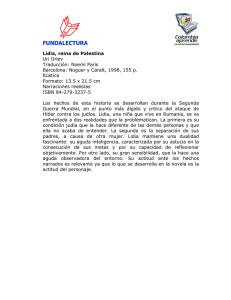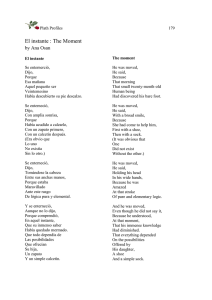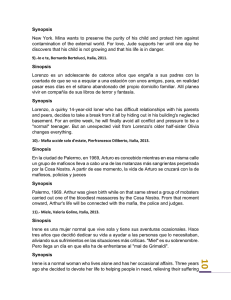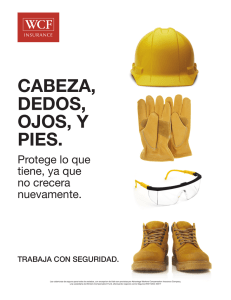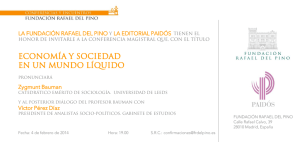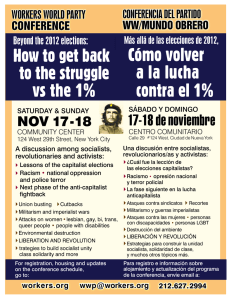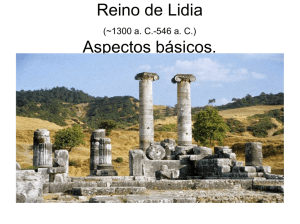Written and Directed by
Anuncio
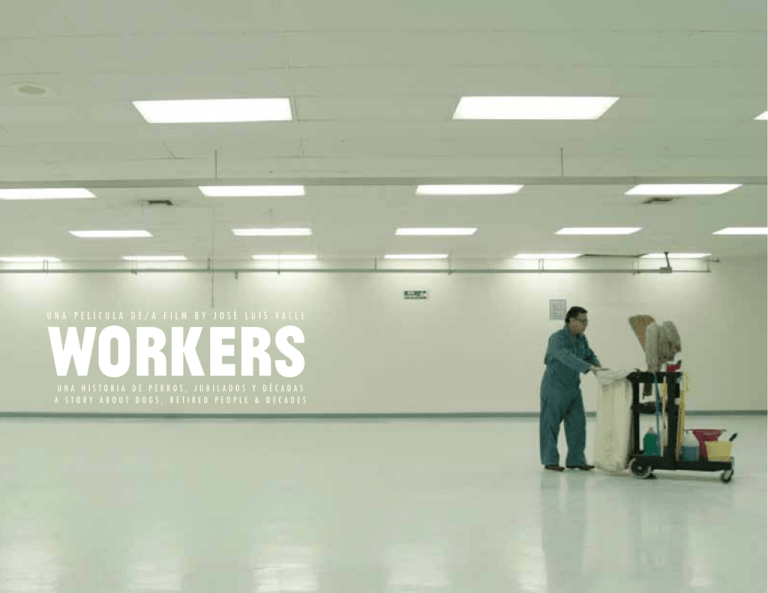
WORKERS JOSÉ LUIS VALLE BIO SINOPSIS / SYNOPSIS SINOPSIS LARGA / LONG SYNOPSIS NOTA DEL DIRECTOR / DIRECTOR´S STATEMENT FICHA TÉCNICA / TECHNICAL INFO CONTACTO / CONTACT Nacido en El Salvador, naturalizado mexicano. Su documental El Milagro del Papa fue estrenado en la Semana de la Crítica del 62 Festival Internacional de Cine de Locarno y obtuvo el Premio FEISAL en el XXIV Festival Internacional de Cine de Guadalajara (FICG). Su tesis estudiantil Quimera ganó la Kodak Filmschool Competition y circuló por varios festivales en todo el mundo. Su cortometraje Vieja el último ganó del 2º concurso “Un minuto por los derechos humanos”, de la Oficina en México del Alto Comisionado de las Naciones Unidas para los Derechos Humanos (OACNUDH), categoría “Derechos de las mujeres y perspectiva de género”. Autor de Cali y Mona, libro en braille para niños ciegos apoyado por el Programa de fomento a proyectos culturales del Fondo Nacional para la Cultura y las Artes. Workers es su primera película de ficción. Born in El Salvador. Mexican citizen. His documentary El Milagro del Papa /The Pope’s Miracle, was selected for the Critic’s Week at the 62nd Locarno International Film Festival, and won FEISAL award at 24th Guadalajara International Film Festival (FICG). His short film Quimera won the Kodak Filmschool Competition and received Honorary Mention from the Jury at 21st Guadalajara International Film Festival (FICG), was also screened at many festivals. His short film ‘Vieja el último’ won the prize “One minute for human rights” of the United Nations Office of the High Commisssioner for Human Rights (OHCHR), category “Women’s rights and gender”. Author of ‘Cali and Mona’, book in braille for blind children supported by the Program and joint promotion of cultural projects of the National Fund for Culture and Arts. Workers is his first feature film. Luego de toda una vida de trabajo en Tijuana, un error de papeleo impide la jubilación de Rafael como empleado de la limpieza en una fábrica. Lidia se entera que en la casa en la que es sirvienta hace décadas, la patrona al morir dejó toda la herencia al perro, y sólo en caso de morir el animal al dinero pasará a manos de los empleados. A su modo, solos y en silencio, ambos iniciarán una lucha: él contra una empresa, ella contra un perro. Curiosamente, estas luchas no se ven. After a whole life of work at Tijuana, Rafael and Lidia are victims of injustice against their rights and dignity: Rafael learns that due to a paperwork mistake, he will not be entitled to his retirement pension. As for Lidia, she finds out that her employer’s will leaves the entire heirloom to the dog, and that the fortune would only be passed down to the employees should the dog die. In their own way, alone and silently, they´ll begin a battle: Rafael against a company, Lidia against a dog. Curiously, these struggles are not visible. Rafael y Lidia compartieron una historia de amor en el pasado y aunque no se ven hace años, sus vidas siguen conectadas por el recuerdo de un hijo muerto. Él limpia las inmensas instalaciones de una fábrica; ella los salones vacíos de una ostentosa casa. Un error de papeleo impide la jubilación de Rafael, y Lidia se entera de que en el testamento su patrona dejó toda la fortuna al perro, y solo en caso de morir el animal la herencia pasará a manos suyas. Al ver de que tras toda una vida de trabajo no serán recompensados, ambos deciden luchar por su dignidad. Él contra la fábrica, ella contra el perro. La vida sigue su rutina de meses y años y trabajo en espiral. Pero ha empezado una guerra silenciosa. Rafael cada día provoca un pequeño daño a la fábrica. Un foco roto, un grifo abierto, un inodoro tapado, una escoba rota. Daños menores que al juntarlos a lo largo de los años suman millones en pérdidas. Por su parte, Lidia sutil y discretamente mina la salud del perro, del que sabe hasta los más mínimos hábitos: sus baños climatizados, los cortes finos de carne que degusta en su punto exacto de cocción, sus masajes, paseos, rigurosos horarios de sueño y demás. Todo lo trastoca para estresar al delicado can, que al cabo de un año muere de muerte natural, según los peritos. Una vez que han triunfado contra la adversidad, la vida vuelve a juntar a Lidia y Rafael pero ellos ni se enteran. En la playa donde la barrera que divide México y Estados Unidos se adentra en el mar, cada quien de un lado de la muralla contemplan una metáfora de ellos mismos: la absurda escena de amor de una pareja separada por un muro. Rafael and Lidia were in a relationship in the past, and although they have not seen each other since they were young, their lives remain entwined by the hypnotic monotony of work and by the memory of their son who drowned in their employer’s pool when he was two years old. Rafael cleaning staff in a factory, leads an austere and solitary life. Lidia is a housemaid for the elderly mother of a drug dealer who lives alone with “Princess”, a refined greyhound with a kingly existence, under ridiculous cares and excesses. Rafael learns that due to a paperwork mistake, he will not be entitled to his retirement pension. As for Lidia, she finds out that her employer’s will leaves the entire heirloom to “Princess”, and that the fortune would only be passed down to the employees should the dog die. Rafael works for the company another ten years. Every day, he inflicts a little damage to the facilities. Nothing serious. Just one small break at a time: a cracked light bulb, a halted industrial assembly part, an open tap, a stuffed toilet, a broken broom. These damages sum up millions in losses over the years. The factory’s administration becomes suspicious and spies Rafael with hidden cameras. He is discovered, fired and compensated, as the factory would lose much more if he sued for not getting his retirement.Lidia and the rest of the house workers perturb the aristocratic habits of ‘Princess’ to stress her, who after a year finally dies of “natural death”, as the experts say. Once they’ve triumphed over adversity, life brings Rafael and Lidia together again, without them knowing. On the beach where the wall that divides Mexico and United Stated goes into the sea, sitting on either side they contemplate a metaphor of themselves: the absurd love scene of a couple separated by a wall. Una vez vi a una sirvienta abandonar la casa en la que había trabajado durante décadas. Su última acción fue observar en silencio el pequeño cuarto donde había vivido. No había nada que verle pero ella lo miraba intensamente. Sus ojos recorrían cada grieta, cada mancha de humedad, cada rugosidad en la textura de la pared... todo le significaba. Sentí empatía natural por ese fragmento tan íntimo de vida al que asistía, porque todos hemos experimentado esos sentimientos de arraigo y pertenencia, la fuerza de los hábitos, y a todos nos ha pasado ese encariñarnos con las cosas y los lugares. Ese fue el germen de Workers, donde la aproximación al trabajo no es en forma de mensaje o denuncia, sino como eje y detonante de emociones y sensaciones universales, articuladas en una historia y una propuesta narrativa audiovisual. ¿Cómo ve el mundo un hombre que ha limpiado las instalaciones de una fábrica durante treinta años? ¿Y una sirvienta con décadas de trabajo en una casa donde lo único suyo es un recuerdo trágico? ¿Cómo los ven a ellos los demás? Porque estar toda una vida en la rutina de un trabajo monótono y marginal forzosamente condiciona nuestro estar en el mundo. Además de contar una historia, me interesó conectar con esa visión del mundo. Workers es un proyecto de largos alientos narrativos. Como concepto esencial se propone la búsqueda de un tempo largo, propio no de las acciones objetivas, sino de la contemplación reflexiva. Si trato de pensar cuál fue el origen de este proyecto que articula inquietudes artísticas y puntos de vista sobre el trabajo y la vejez, encuentro que fue un comentario de mi padre sobre su edad. “Yo ya no puedo hacer planes a largo plazo”, dijo sin dramatismo, sólo con la cansada resignación de quien se le acaba el tiempo. I once saw a maid leave the house she worked in for decades. She silently observed the empty room that used to be hers. It was an uninteresting space, barely a few square feet, but she looked at it intensely, as if there were a lot to see. Her eyes travelled across every crack, every water stain, every rough spot in the wall’s texture… everything meant something to her. I felt a natural empathy towards this fragment of life I was a spectator to, because we’ve all experienced these feelings of belonging, the strength of habits, and we’ve all become fond of things and places. That was the seed of Workers, where the approach to work is not in the shape of a “message” or a complaint, but as life experiences that bring dignity and emotional balance, along with subsistence. How does a man who worked cleaning a factory over thirty years see the world? What vision of life does a housemaid who’s worked in the same house for decades - a house where the only thing she has is a tragic memory - have? How do others see these people? Following a monotonous and marginal routine for a whole lifetime necessarily conditions our being in the world. Apart from telling a story, connecting with this singular point of view of the world is the aim of this project. Workers is a project that focuses on the essential concept of the search for an extended narrative timeline, issuing from reflexive contemplation rather than from objective actions. I believe the moving force that definitely pushed me to write Workers, articulating the stories, artistic concerns and points of view on work and old age in this manner, was my father’s comment concerning his age. “I can no longer make long term plans”, he said without drama, with the tired resignation of someone whose time is running out. Título / Title: Workers (120 min, DCP color, México-Alemania 2013) Guión y Dirección /Written and Directed by: José Luis Valle Producción/Production: José Luis Valle Producción Ejecutiva/Executive Production: Elsa Reyes Fotografía/Cinematography: César Gutiérrez Miranda Edición/Editing: Óscar Figueroa Supervisión de Postproducción/Postproduction Supervisor: Ariel Gordon Sonido/Sound: Pablo Tamez/José Miguel Enríquez y Pablo Fernández Dirección de arte/Art Direction: Gabriela Santos del Olmo Con/With: Susana Salazar y Jesús Padilla Movie Partners in Motion MPM Film (Movie Partners in Motion) 17 rue Julien Lacroix, 75020 Paris, France T + 331 58 53 57 12 F + 331 42 81 42 50 [email protected] www.mpmfilm.com Sales contact : Pierre Menahem M + 336 62 08 81 79 [email protected] Elsa Reyes ZENSKY CINE Tepic No. 55 Col. Roma 06760, D.F., México [email protected] Autentika Films Paulo de Carvalho / Gudula Meinzolt Babelsbergerstr. 46 10715 Berlin Germany [email protected] mobil: +49 177 7071 698 Instituto Mexicano de Cinematrografía IMCINE Insurgentes Sur No. 674 Col. Del Valle 03100, D.F. México [email protected]
